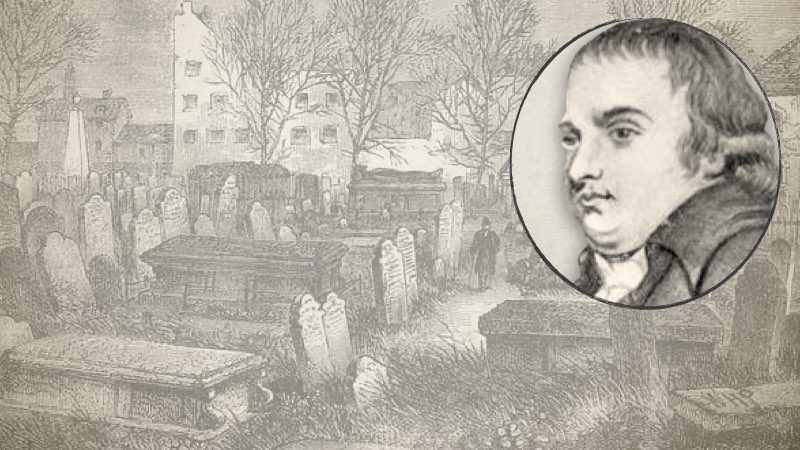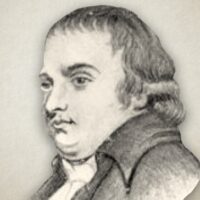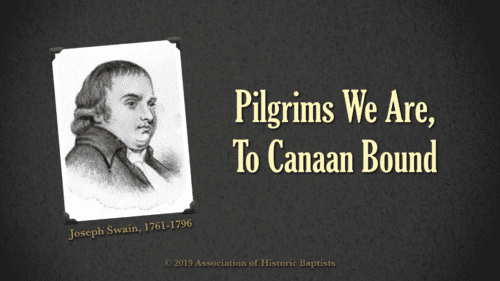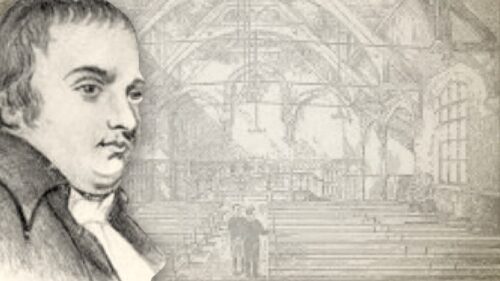
The Life And Death Of Joseph Swain
J. A. Jones, “Bunhill Memorials: Sacred Reminiscences Of Three Hundred Ministers And Other Persons Of Note, Who Are Buried In Bunhill Fields, Of Every Denomination” (1849):[1]
Joseph Swain, Baptist. In memory of the Rev. Joseph Swain, of Walworth, obt. April 14th, 1796, set. 35.
Headstone, E. And W. 84,—N. And S. 30.
Joseph Swain was born at Birmingham in the year 1761. His father and mother died when he was very young, which was no small disadvantage to him with regard to his education. At an early age he was put apprentice to engraver. On his coming to reside in London, he became acquainted with a circle of gay and thoughtless youths, that were extremely fond of plays and dancing, and being himself naturally of a lively cheerful disposition, and possessing a poetical turn of mind, his company was much desired and sought after. At this period he composed some songs, poems, and plays.
However, in the midst of these carnal pursuits, it occurred to his mind, that he was in the road to destruction, and that his end would be miserable. He therefore purchased a Bible; his convictions of sin increased; and his conscience became greatly alarmed with apprehensions of eternal ruin. In his Diary of April 2, 1782, he describes the state of his mind—“I was followed, for about six months, with dreadful ideas of eternal torments, fearing lest by fire, or sickness, I might be removed into the endless fire of hell. Still I found that I loved my sins, and was not able to give them up, though I feared the punishment due to them. After a long succession of these things, together with many legal workings, and various attempts to make my own peace with God; as I was going one day with my companions in sin to a place of entertainment, I felt my heart gradually melted, not only into love of being, but, into love of my own well being. I then attempted to seek God by prayer, to which exercise I had hitherto been a stranger. I had also many passages of Scripture brought to my remembrance; wherein I saw myself as a sinner, and Christ as a Saviour. Yea I saw and believed that he died for me, and that I should soon be with him in glory. O how did my enraptured soul rejoice, at that time, in this great salvation. So great was the peace and satisfaction of my mind, that I thought I could bear to be confined in the darkest dungeon, provided I might feel there, what I then felt, of the presence of God in my soul.—But ah! the heavenly vision was not of long continuance, as I soon found by experience: the heavenly scene was snatched away, leaving but the remembrance of it; except that, in my heart, I felt an aching void that Christ could only fill.”
No sooner was Mr. Swain acquainted with the way of Salvation, than he began to warn his companions of their danger; and told them plainly, that, if they would not go to heaven with him, he would endeavour to go there by himself. Having been need to write Songs, and to sing them for the amusement of himself and his carnal companions; he now began to write some precious Hymns, which employment proved very beneficial to his spiritual mind. As he was singing one of his Hymns, a person overhearing him inquired “whose it was!” He replied, “It is my own.” This friend gave him an invitation to go with him to Spa Fields Chapel, to which he consented. But it is not easy to describe the surprise he felt, and the delight he enjoyed, in hearing the same things from the pulpit, which he himself had so recently experienced. This discourse, which was preached by Mr. Wills, was the first evangelical sermon he ever heard. He said, “I am sure what the preacher said is true; for, he has described my feelings better than I can myself.”—Soon after this, he was taken to hear an Arminian preacher; and his friend conversing with him respecting that sermon, and he giving his opinion upon it with some freedom, the person replied, “Why you are a Calvinist.” Mr. Swain, not knowing the distinction between the various denomination, answered, “I am no Calvinist, I am a Christian.” The friend, however, finding his sentiments to bear that aspect, advised him to go and hear Dr. Rippon, saying; “I think his preaching would suit you.” Accordingly he went, and after attending the Doctor’s ministry at Carter Lane for some time, he made a public profession of his faith in Christ Jesus, was baptized May 11, 1783, and went on his way rejoicing. Indeed about this time he was so remarkably full of love and zeal, that some of his friends thought he would soon be In heaven. After hearing a sermon, preached by John Berridge, he said to his wife, “My dear, I do think I shall die with joy.”—Reader, take his rapturous experience, in his own words.
Heaven draws my spirit to its blissful shore,
Abd bids my heart to things eternal soar;
Earth holds my senses by a thousand strings,
And, when my thoughts would mount, contracts their wings.
From what strange cause springs this peculiar strife?
I long to die,—yet still am fond of life:
I bless the Lord who lends me vital breath,
Yet, leap for joy, as thought of certain death!
O when the Lord himself, with grace and power,
Displays his glories in some favour’d hour;
When love appears supreme upon the throne,
And points my soul to its immortal crown;
Loose fly the strings which held my heart to earth,
Up springs the passions to celestial birth;
And, one bright glance of Jesus, makes me say,
I’ve none, on earth,—in heav’n I’ve none but Thee!
Mr. Swain on being called out by the church to the work of the ministry, commenced his stated labours at East Lane, Walworth, in June, 1791; and his preaching there being rendered very useful, a church was formed, and he was ordained to the pastoral office over them February 8th, 1792. Mr. Swain also preached a Lord’s Day evening lecture at Devonshire Square meeting, for several years; and attracted by his evangelical style of preaching, a large congregation. His hearers also at Walworth greatly increasing, they first erected galleries, which proving insufficient, they enlarged the place; but so crowded even then was the meeting-house, that they determined to enlarge it a second time, but a little while previous to his last illness. His church also which at its formation consisted only of twenty-seven members, in the short space of four years increased to upwards of 200. Such an addition, under one minister, in so small a space of time, is rarely known.
But in the meridian of life, and in the midst of his ministerial usefulness, his Lord and Master was pleased to call him home. He had an infirm constitution, and frequently laboured under much bodily weakness; but he was favoured to enjoy an habitually cheerful disposition. His last illness was comparatively short, but very affecting; being for a considerable part of the time under the controlling power of a strong delirium. When this subsided, the frame of his mind was serene and comfortable. He said to his wife, “O my dear, I perceive I have been under a mistake; I thought I was getting better, but I now feel I after very bad. I have been seeking the Lord about my case, and can get no other answer, but this, “Set thy house in order; for thou shall die, and not live.” On seeing her much affected, he said, “O, my dear, don’t grieve; the Lord can make you a happy widow. You were happy in the Lord before you knew me, and he can make you happy when I am gone!” He then exclaimed, “O my dear Redeemer, am I coming to thee so soon? Is my work done? It is just fourteen years since I first knew thee, Lord! If it were thy will, I should rejoice to labour a little longer with the dear people: yet, not my will, but thine be done.” After conversing about temporal concerns, he returned to the solemn subject of death; and said, “I am not afraid to die; I have not the shadow of a doubt: I know that 1 shall receive my crown.” He exhorted those around him to aim at living near to God; and to wrestle with him in prayer, for the fulfillment of his gracious promises. After being greatly afflicted for about fourteen days, he was dismissed from all his labours and cares; from all temporal sufferings; and, doubtless, was received into the bosom of eternal bliss, April 14th, 1796, in the 36th year of his age; having been in the work of the ministry only about five years. His remains were deposited in Bunhill Fields, April 22nd, and his funeral was attended by some thousands of people; very many of whom were deeply affected to think that they should see his face no more. Mr. Abraham Booth delivered the address at the interment; and on the following Lord’s day, Dr. Rippon and Mr. Upton preached funeral sermons on the occasion, at Walworth, to crowded congregations.
As a Christian, and a gospel minister, Mr. Joseph Swain rejoiced in, and preached the glorious doctrines of sovereign grace, and revered the authority of divine precepts. As a pastor, he was laborious, watchful, faithful, and affectionate. He was a strenuous advocate for what he considered as the revealed will of his Lord, whether it respected doctrines or precepts; positive institutions, or, the primitive order of Christian Churches; while he esteemed all those whom he considered as loving our Lord Jesus Christ in sincerity. His Walworth Hymns have almost an incomparable gospel sweetness in them. His poetieal Letter, addressed to Mr. Pearce, of Birmingham, comprises fifty verses, and contains a precious all-interesting account of his conversion to God. It ought to be circulated among the churches of the saints, by tens of thousands. With the following beautiful lines, written by Swain, the Editor of Bunhill Memorials Reluctantly closes this account. Reader—listen to him:—
I love to think of heaven, where I shall meet
My fellow travelers; and where, no more
With grief or sin my mind will be disturb’d:
Where holy saints, and holy angels, dwell
In constant harmony, and mutual love!
But, when my heart anticipates the sight
Of God incarnate—wearing on his side,
And hands, and feet, those marks of love divine
Which he on Calvary for me endur’d,
All heaven beside is swallowed up in this;
And He who is my hope of heaven below,
Appears the glory of my heaven above.”—I.
——————————-
[1] The reader is encouraged to visit Bunhill Fields, a nonconformist cemetery located at 38 City Road, London, England.
Joseph Swain (1761-1796) was a Strict and Particular Baptist preacher and hymn-writer. In 1792, he was appointed pastor of the Baptist church meeting on East Street, Walworth, a position he held until his death.





